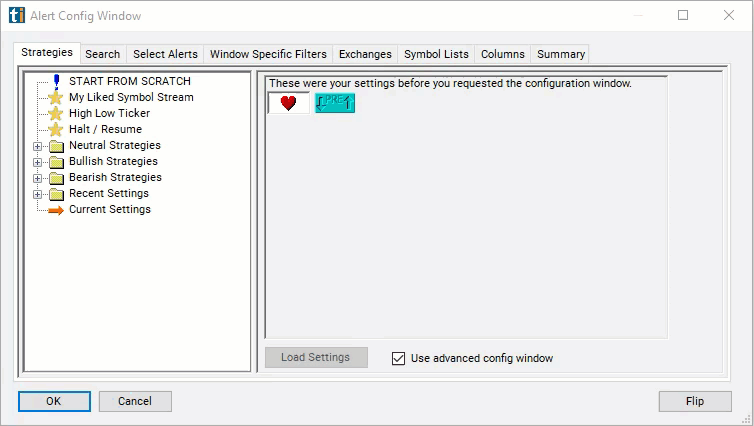Position in 5 Day Range
Table of Contents
- Understanding the Position in 5 Day Range Filter
- Position in 5 Day Range Range Filter Settings
- Using the Position in 5 Day Range Filter
- FAQs
Understanding the Position in 5 Day Range Filter
The "position in 5-day range" filter is used to evaluate where the current price of a stock stands relative to its price range over the past five trading days. This filter helps traders assess the recent price movement of a stock and identify potential trading opportunities based on its position within this range.
Here's how the "position in 5-day range" filter works:
Calculation of 5-Day Range: The filter calculates the price range of the stock over the past five trading days. This range typically spans from the lowest price (low) to the highest price (high) traded during this period.
Position Calculation: Next, the filter determines the position of the current price within the 5-day range. This calculation is expressed as a percentage, indicating how far the current price is from the lowest or highest price of the past five days.
This uses the same scale as the other position in range filters. 0% means that the stock is currently trading at the lowest price that it has traded in the previous 5 days. 100% means that the stock is trading at the highest price of that time frame.
This filter is similar to the Position in Previous Day’s range filter, because it does not look at today’s data when they calculate the range. If the current stock price is $10, and the highest price in the previous 5 days was $9, then the value of this filter will be above 100%. If the current price is less than the lowest price of the last 5 days, then this filter will have a negative value.
The current price is based on the last print. There is no smoothing or averaging. These filters update before, during, and after market hours.

The column for this scan will be displayed as a graphical indicator. To view the percentage, simply right-click on the column and deselect the option labeled "Graphical Indicator."
If you opt to utilize the graphical indicator, here's a brief overview of the various types of graphics and their corresponding meanings:
 =
= 
 =
= 
 =
= 
Position in 5 Day Range Range Filter Settings
The settings of each Trade Ideas filter are defined in the Window Specific Filters Tab located in the Configuration Window of your Alert/Top List Window.
Here is how to setup the filter in your configuration window:
- Set the minimum value to 25 to see stocks which are at least 25% above the low of its 5 day range.

Using the Position in 5 Day Range Filter
Several trading strategies can be employed with the Position in 5 Day Range filter. Here are a few examples:
Reversal Trading: Contrarian traders may look for stocks that have moved significantly away from the high or low of the 5-day range, indicating potential overbought or oversold conditions. If the price shows signs of reversal near the high or low of the range, such as bearish or bullish candlestick patterns, traders may enter positions anticipating a reversal back toward the mean.
Range Trading: Traders may identify stocks that are trading within the 5-day range and look to capitalize on price oscillations within that range. They may enter long positions near the low of the 5-day range and short positions near the high, aiming to profit from price reversals back toward the mean.
Volatility Breakout: Traders may use the position in 5-day range filter to identify periods of low volatility where the price remains within the 5-day range. When the price breaks out of this range, indicating a surge in volatility, traders may enter positions in the direction of the breakout, aiming to profit from the ensuing price movement.
FAQs
What does the "position in 5-day range" filter indicate?
- This filter indicates the current position of a stock's price within its price range over the past five trading days. It helps traders assess whether the current price is closer to the high or low of the recent price range, providing insights into recent price momentum.
Why is the "position in 5-day range" filter important in trading?
- This filter is important because it helps traders gauge recent price momentum and identify potential trading opportunities. It provides insights into whether the stock is trading near its recent highs or lows, which can be useful for determining potential breakout or reversal points.
Can the "position in 5-day range" filter be used for both short-term and long-term trading strategies?
- Yes, the filter can be used for both short-term and long-term trading strategies. Short-term traders may use it to identify intraday or swing trading opportunities based on recent price momentum, while long-term traders may use it to assess the overall trend direction.
How should traders interpret different positions within the 5-day range?
- Traders may interpret a position closer to the high of the 5-day range as indicating bullish momentum or buying pressure, while a position closer to the low may suggest bearish sentiment or selling pressure. However, interpretation may vary based on other factors such as volume and news catalysts.
Filter Info for Position in 5 Day Range [R5D]
- description = Position in 5 Day Range
- keywords = Single Print
- units = %
- format = 1
- toplistable = 1
- parent_code =






 Position in 10 Day Range [R10D]
Position in 10 Day Range [R10D] Position in 20 Day Range [R20D]
Position in 20 Day Range [R20D]